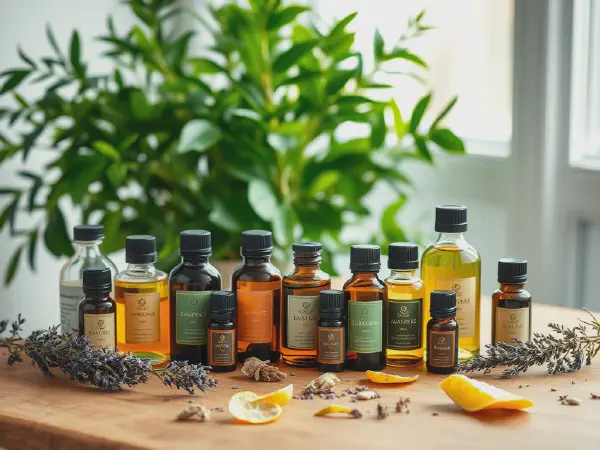Essential Oils: A Beginner’s Guide to Uses & Benefits

The Comprehensive Guide to Essential Oils
Essential oils are concentrated, plant-derived extracts that capture the natural aroma and essence of various botanical sources. Often utilized for their aromatic and therapeutic properties, essential oils have gained popularity in the fields of aromatherapy, skincare, and holistic wellness.
The therapeutic benefits of Essential oils in aromatherapy are widely recognized, enhancing both physical and mental well-being.
The usage of essential oils can be traced back thousands of years, crossing different cultures and regions. The serenity and healing properties associated with these oils have been valued for their ability to improve physical and mental health, making them a staple in wellness practices worldwide.
Different types of essential oils exist, each with its unique characteristics and benefits. Common essential oils include lavender, peppermint, eucalyptus, and tea tree oil, each sourced from distinct parts of plants like flowers, leaves, bark, and stems. Understanding these differences can enhance your experience in using essential oils.
Essential oils can be used in various ways, including diffusion, topical application, and even ingestion in therapeutic contexts. Their versatility makes them a valuable addition to personal care routines, living spaces, and health practices.
In summary, essential oils are not only pleasant to smell but offer a myriad of benefits for physical, mental, and emotional health. This guide will delve deeper into what essential oils are, their uses, benefits, precautions, and some DIY recipes to get you started on your essential oil journey.
Introduction to Essential Oils
What are essential oils? Essential oils are highly concentrated liquids that are extracted from different parts of plants—such as flowers, leaves, stem, roots, and fruits—using methods such as steam distillation or cold pressing. These oils capture the fragrant essence of the plant, making them potent and valuable for a variety of applications. Essential oils are often used in aromatherapy, one of the most common methods of integrating these natural products into everyday life, wherein scents are inhaled or dispersed to produce beneficial effects on body and mind.
The history and origins of essential oils date back to ancient civilizations. Cultures such as the Egyptians, Chinese, and Greeks utilized essential oils in religious ceremonies, medicine, and cosmetics. The art of extracting oils from plants spread over centuries, evolving into modern methods used today. Essential oils were also recognized during the Middle Ages for their healing properties, which further solidified their place in natural remedy practices across the globe.
Different types of essential oils offer a range of benefits and aromas. For example, lavender essential oil is known for its calming effects, while peppermint oil is often used for its invigorating qualities. Other notable essential oils include tea tree oil, which has antibacterial properties, and eucalyptus oil, famous for its respiratory benefits. With over 90 types of essential oils available, each oil has its unique properties and potential applications.
Common Uses of Essential Oils
Aromatherapy is one of the most popular applications of essential oils. This practice involves inhaling the scent of essential oils for therapeutic benefits. For instance, diffusing essential oils like lavender or chamomile can create a calming atmosphere, promoting relaxation and reducing anxiety. Studies have shown that certain scents can positively affect mood, stress levels, and overall well-being, making aromatherapy a valuable tool in holistic health.
Using essential oils in skincare has also become a favorite among beauty enthusiasts. Oils such as tea tree and lavender have natural anti-inflammatory and antibacterial properties, making them excellent choices for acne-prone skin. Additionally, oils like rose and sandalwood can promote hydration and rejuvenation, helping to maintain healthy, youthful skin. Proper dilution and cautious application are crucial, as essential oils are potent and can cause irritation if used improperly.
Essential oils are widely recognized for their ability to promote relaxation and relieve stress. Scents like bergamot and frankincense have been used for centuries to ease tension and promote a sense of peace. Whether through diffusing oils, adding them to a warm bath, or incorporating them into massage oils, many people find that essential oils can play a vital role in stress management and mental wellness.
Benefits of Essential Oils
The health benefits of essential oils are substantial. Many essential oils possess antimicrobial, anti-inflammatory, and antioxidant properties, making them useful alternatives for natural health remedies. For example, oregano oil is known for its antibacterial effects, and peppermint oil can assist with indigestion and headaches. However, it’s essential to consult a healthcare professional before using essential oils as a treatment option.
Essential oils can enhance mental clarity and cognitive function. Oils such as rosemary and lemon are often cited for their uplifting and invigorating effects, which can help improve focus and concentration. Inhaling these scents while studying or working can stimulate the mind and boost productivity, making them popular among students and professionals alike.
Certain essential oils can boost the immune system. Oils like tea tree, lemon, and eucalyptus are known for their immune-boosting properties and can be used to support wellness during cold and flu season. Regular use of these oils, through inhalation or topical applications, may help fortify the body against illness and infections.
Safety and Precautions
To safely use essential oils, it is crucial to follow guidelines and best practices. Essential oils should never be ingested without professional guidance, and it is essential to perform a patch test before applying them topically to check for potential reactions. Additionally, essential oils should always be stored properly away from children and pets to avoid accidental exposure.
Dilution methods for beginners are vital for safe application. Essential oils should be diluted with a carrier oil—such as coconut, jojoba, or olive oil—before applying them to the skin. A common dilution ratio for adults is 1-2 drops of essential oil per teaspoon of carrier oil, while children and sensitive individuals may require even greater dilution to avoid adverse effects.
Allergies and reactions to essential oils can occur, and it’s important to be aware of any sensitivities. Some individuals may experience skin irritation, allergic reactions, or respiratory issues when exposed to certain oils. If any adverse reactions occur, discontinue use immediately and consult with a healthcare professional.
DIY Recipes with Essential Oils
Essential oil blends for home cleaning are easy to create and provide a natural alternative to commercial cleaners. A simple recipe includes combining white vinegar, water, and a few drops of essential oils like lemon or tea tree for a disinfecting all-purpose cleaner. These natural blends not only clean effectively but also leave a pleasant aroma throughout your home.
Creating personal care products with essential oils allows you to customize your skincare routine. For example, you can make a moisturizing body lotion by mixing unscented lotion with lavender or chamomile oil for soothing benefits. Additionally, using essential oils in shampoo or conditioner can add fragrance and condition your hair naturally.
Relaxing bath blends using essential oils can transform your bath experience into a soothing retreat. Combine a few drops of essential oils like lavender or eucalyptus with Epsom salts for a calming soak that eases tension and promotes relaxation. This simple addition can enhance your self-care routine and provide a tranquil environment at home.
